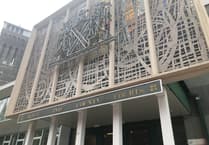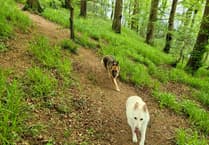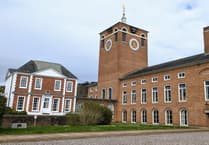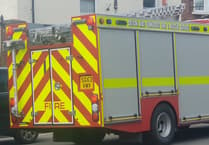A TREASURE-trove of memories has inspired a new book by a West Devon WI branch to celebrate the new millennium.
'Gulworthy — A Crossroads in Time' is a potted history of a parish which has lived through tremendous changes in the last two centuries.
Elizabeth Harding, of Gulworthy WI, said: 'Three years ago we had a celebration of 100 years of the parish hall. There were lots of photographs. We overheard parishioners reminiscing about life gone by and we said, "if only we had a tape recorder".
'The idea came from there.'
The WI team sourced likely candidates from the parish, recorded their interviews and the hard work of writing began in earnest.
The work did not stop there — illustrations, photographs and advertisers all had to be found too. The team was helped with production costs by a £300 grant from the parish.
'We are absolute amateurs — but I think we are reasonably satisfied with what we have done,' Elizabeth said.
Some of Gulworthy's hamlets — Ogbeare, Lumburn and Ottery — were mentioned in deeds long before 1066 and Morewellham was of major importance to Tavistock Abbey, but the parish was a quiet agricultural area until early Victorian days.
Then, Francis, 7th Duke of Bedford gave permission for mining investigations on his huge estates which included Gulworthy.
By the end of 1844, a huge copper lode was discovered and Devon Great Consols mine opened which eventually became one of the richest in the world.
Within a short time the Duke had built miners' cottages for the hundreds of workers attracted to the area, and the new church of St Paul's to provide for their spiritual needs.
'It really was like a gold rush,' said Elizabeth.
As the population grew, the Duke went further, paying for a new school in 1855 and the parish room in 1897.
The quiet rural parish became a busy community, profoundly changed by the wealth discovered beneath the valleys.
Not just copper was mined in Gulworthy — many tons of slate were quarried at Mill Hill and arsenic was produced.
In the book, Muriel Symons remembered prisoners during the last war set to work dismantling old arsenic flues with their bare hands, apparently without any ill-effects.
She recalled visitors praising the flavour of her family's home-produced carrots — which her father attributed to the arsenic in the ground!
In 1976 when Alice Arrowsmith was 92, she wrote an account of life in Mill Hill from around 1885 which is included in the book.
She described the life of the mine workers at Devon Great Consols, underground by 6am each day after walking from home.
'They carried their crib in a white calico bag — sandwiches or pasties, tiddy and meat and onion, bacon and egg, turnip and mutton etc, or a toad in the hole, a hobbin, tiddy cake or fish pie.
'They had a Waterberry watch costing just a few shillings and they had tallow candles for lights.'
After work, the men would walk two miles home for a meal, a 'pipe of baccy' and set to work in the vegetable garden.
'There was a pump at each end of the village which gave us beautiful, fresh, crystal-clear water which had to be fetched in pitchers and buckets.
'The vegetables would be taken, generally by the children, and washed for the next day's cooking in the evenings,' Alice remembered.
While the men were at their jobs, their wives were working hard at home.
Monday was wash-day, when a copper tub filled with water from the communal pump was boiled over a wood fire.
Clothes were washed with Puritan soap or Rinso, whites boiled in a separate tub and blue-rinsed. No automatic washing machines then — the clothes went through the mangle before hanging out if it was dry.
Tuesday was ironing day, Wednesday baking day, Thursday the house was cleaned and tidied, before shopping day on Friday at Tavistock market.
More baking and housework followed on Saturday — the Sabbath was devoted to Sunday roast, Sunday school, chapel and church and wood collecting for Monday's wash-day fire.
Vegetables were grown at home with many people owning their own chickens or pigs — and nothing was wasted.
Doris Symons remembered the pig being slaughtered by a Mr Reynolds.
'We would have the window open so we could see what he did, but stuff fingers in our ears so we couldn't hear the squeals!'
She can remember helping her mother wash the pig's entrails out three times a day for three days, then making meat puddings, groat puddings and chitterlings.
Children walked miles to get to school, where the day began at 8.30am with a hymn and a prayer. A punishment book was kept giving a record of misdemeanours, among them pulling up the girls' skirts and playing after the bell had been rung!
Church and chapel played a large part in the social life of the Gulworthy hamlets for children and adults, with Sunday school outings, bazaars, harvest celebrations and 'Sankey' evenings, named after the American evangelists Sankey and Moody.
Elizabeth Harding said memories in most cases were very sharp.
'One of the things that came out was about the food — people kept saying that it tasted better than you get now.
'The other thing was the distances they walked and the hours they worked,' she said.
'Things which were very vivid were the games they played on 'the floors', where the minerals used to be stored and sorted — this was after the mining had finished.
'One of them said they used to go out in the morning and wouldn't come home until it was time for tea — children couldn't do that now.'
But there was one phrase which cropped up more than any other — 'We thought nothing of it'.
l 'Gulworthy - A Crossroads in Time' is available priced £4.50 from the Tourist Information Office and Bookstop in Tavistock.



